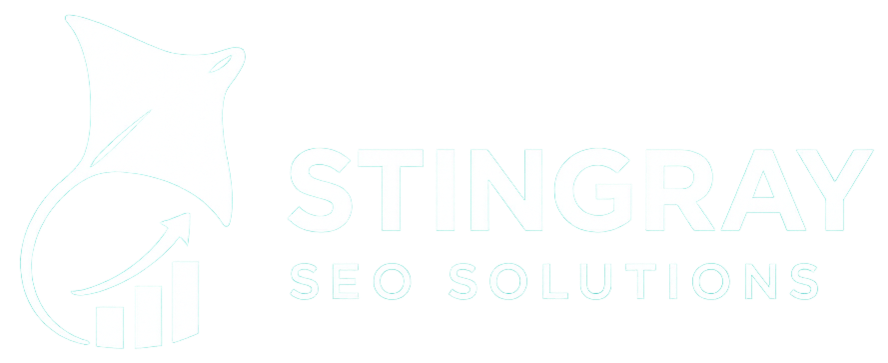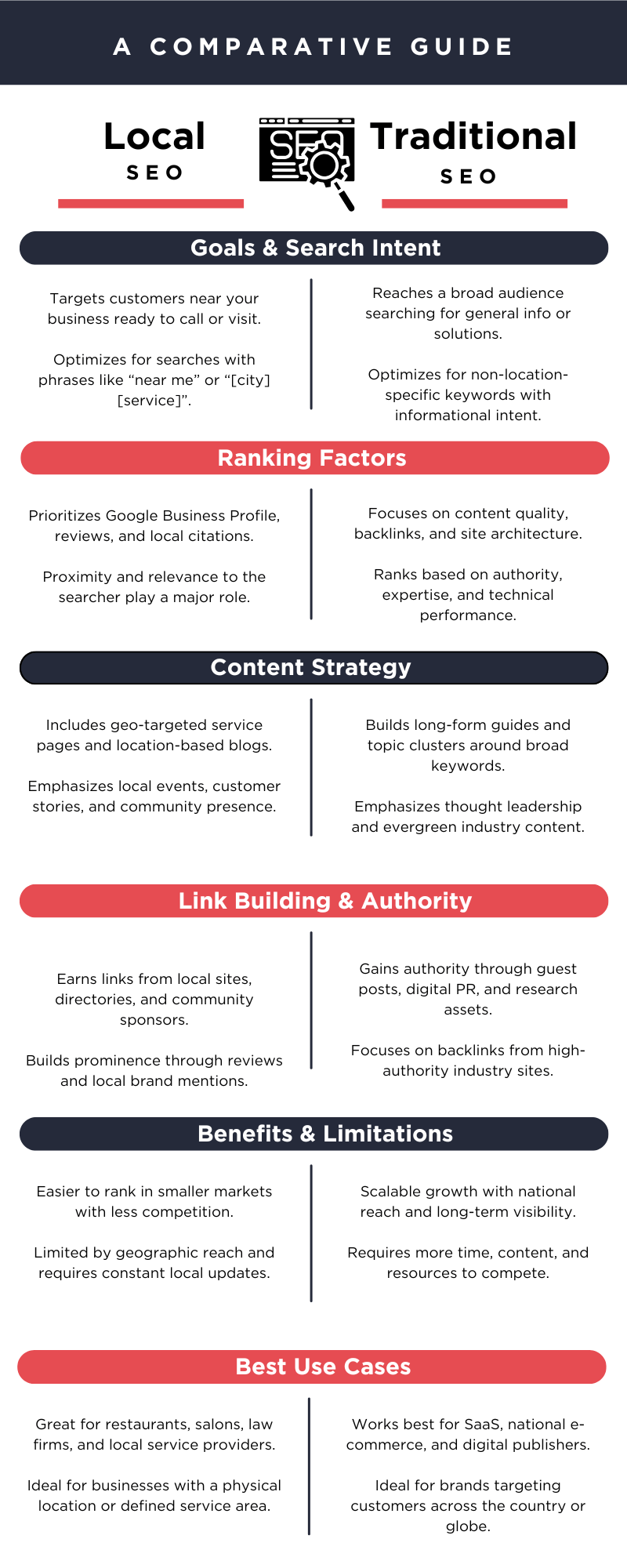One way to think about this comparison is that local SEO and organic/traditional SEO have different goals. Local SEO is about making your business more visible to searchers in your area. Traditional SEO is about increasing your visibility in non-location-based search results. In other words, you want to reach people no matter where they are.
In some ways, AI is upending SEO and digital marketing, so business owners need to know the difference between these two approaches to search engine optimization. You need to know if it is better to focus on local SEO or if you can still benefit from traditional SEO strategies.
Stingray SEO Solutions has crafted a detailed guide to traditional and local SEO. Covering what you need to know about each strategy, from the pros and cons and best practices to what strategy may be best for your kind of business.
Need to know what strategy to use for your business? Contact us to schedule your free SEO consultation. Our goal is to increase your visibility online, so you can reach more of your customers.
Call today to learn more: 561-316-8137.
What is Search Engine Optimization (SEO)?
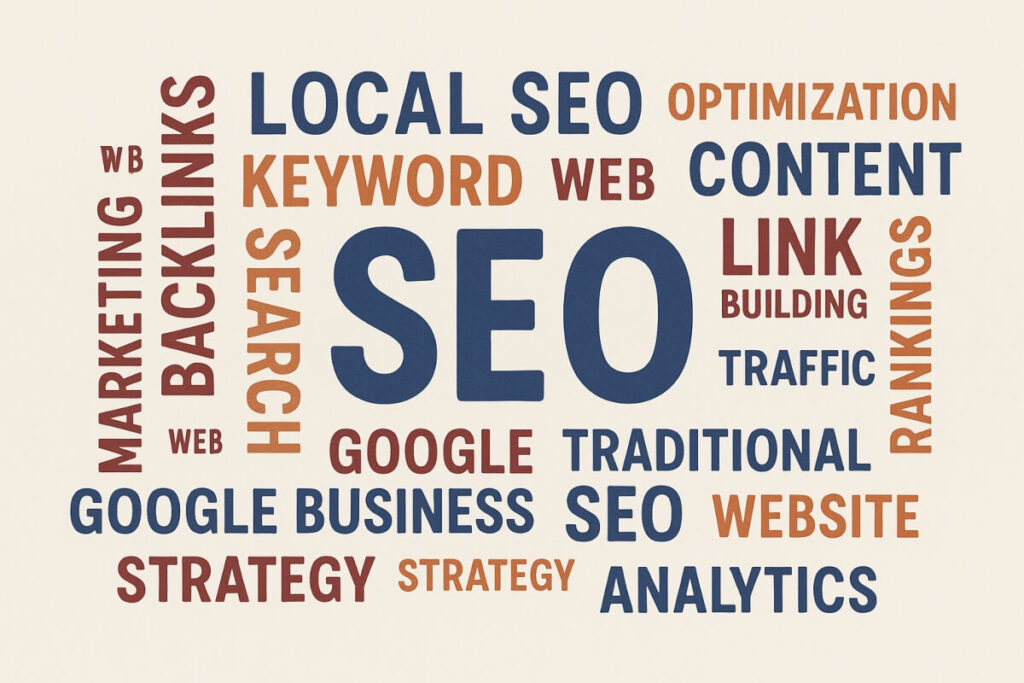
SEO has been around for decades, but you’ve been busy building your business and you might not know what it means.
First, the acronym stands for search engine optimization. SEO is a quicker way to say making your website more visible when people search for things online. You could think of it as marketing your website without paying for advertising.
There are many ways you can increase the odds that Google will serve your website to people who are searching for the kinds of products, services or information your website provides.
Decades ago, many people thought SEO was all about stuffing your website full of relevant keywords. However, that was not entirely accurate then, and it certainly is not in 2025. There are many components of SEO, beyond simply the words on the pages of your website:
- Technical optimization – This means optimizing the code on your website. For example, making sure your site is coded in such a way that it will load quickly on mobile devices. You also want clean code that is easy for Google to crawl.
- Optimized content – Publishers that create valuable, relevant content that answers users’ questions are often rewarded with a high ranking in Google, which can bring traffic and leads to your website.
- Keyword optimization – Strategically using terms people search for throughout your website, especially in the meta title, description, headline and body content. However, you want these words to appear naturally. Users and search engines don’t like unnatural, keyword-stuffed pages.
- User experience – You want to make your site easy to navigate, both for Google and more importantly, your users. We’ve all dealt with clunky, difficult-to-navigate sites. It makes for a poor user experience. Google knows this and tends to reward sites with better user experience.
- Links – There are many factors in Google’s algorithm, but SEO professionals and business owners have found that links are arguably the most important. Links demonstrate trust and confidence in your website. If you optimize your website and obtain backlinks, you are well on your way to ranking higher in search results.
The goal is not just to rank higher in search results, it’s to attract customers who end up buying your products or services. If you do SEO well, it can be a tool that drives long-term growth for your business.
What Are the 4 Types of SEO?
You could divide SEO into four different types: technical SEO, on-page SEO, off-page SEO and local SEO. Traditional SEO makes use of the first three types, while local SEO is it’s own thing.
1. Technical SEO
Technical SEO is about optimizing the code on your website. This is what Google sees when it crawls your website. It interprets the code, so it can then index your site. There are many aspects of optimizing your website code, such as:
- Site speed optimization
- Mobile responsiveness
- SSL certificates and security
- XML sitemaps
- Schema markup
- URL structure
- Internal linking architecture
2. On-Page SEO
This refers to the content on the pages of your website, including the text, images and videos. SEO professionals focus on optimizing many on-page aspects:
- Title tags and meta descriptions
- Header tags (H1, H2, H3)
- Body content
- Image alt tags
- Content quality and relevance
- User engagement (how long users stay on the page, how much they engage with the elements on the page, etc.)
3. Off-Page SEO
These are the things from outside of your website that can affect your ranking in search results, such as:
- The number and quality of links pointing to your website
- Social media signals, such as likes, shares and links pointing to your site
- Brand mentions and citations, such as listings in local directories or on news websites
- Guest posting and content marketing
- Online reputation management
- Local directory listings
4. Local SEO
Local SEO is about sprucing up your website and off-page signals to make your site rank higher in local searches. Local SEO involves:
- Google Business Profile optimization
- Local keyword targeting
- NAP (Name, Address, Phone) consistency in your citations
- Local citation building
- Review management, including how many reviews you have acquired, how often they come in, the quality of those reviews, and more
- Location-specific content, such as content that includes your service area on the meta title
Should I Do SEO for My Business?
Absolutely. While there are certainly other ways to market your business to potential customers, most people find or learn about products or services online. They visit websites, read reviews, see what people are saying about you on social media or look to see how close you are to their location.
Effective SEO makes it more likely they will see your business when they search. If your business is not one of the first ones they see in search results or Google Maps, or it’s not being cited in AI overviews, potential customers are going to go somewhere else.
SEO has several benefits for many different types of businesses:
- Cost-effectiveness: Advertising is expensive, and many businesses can’t afford it. SEO can provide long-term results without the need for ongoing advertising. Once you get high rankings, you can play defense to stay there. This can be much cheaper than paying for Google Ads.
- Credibility and trust: Users trust organic search results more than paid advertisements. If your site has risen high in search results, people figure it must be more trustworthy than other businesses. While there may be exceptions, this is often true.
- Sustainable growth: While SEO takes time to generate results, once it starts working, you often get a steady stream of business for years to come.
- Competitive advantage: If you do SEO and your competitors don’t, SEO has a built-in advantage for your website.
However, SEO might not be the best strategy for certain situations, such as when:
- You need immediate results – pay-per-click ads or local services ads may work better for you
- You don’t need the Internet to generate business for your site, you may already have more than enough
- You have limited resources and can’t afford professional assistance with your website
Ready to explore how SEO can transform your business? Schedule a free consultation to see how Stingray SEO Solutions can help.
What is Local SEO?
Local SEO means optimizing your website and Google Business Profile for local searches. For example, if you own a seafood restaurant, and someone in your local area searches for “seafood restaurants near me”, local SEO can help your business show up in Google Maps
Here are some of the main ways local SEO is different from traditional SEO:
- Local SEO is Geotargeted: Local SEO targets customers within a specific geographic area, typically within a few miles of your business location.
- Local SEO Focuses on Commercial intent: Local searches often have commercial intent. In other words, the people who do these searches are ready to call or go to a business. They are ready to spend money, as opposed to someone who is looking for information.
- Local SEO Triggers Certain Types of Results: Local searches can trigger Google Business Profiles, Local Map Pack results, Geotargeted organic results and “Near me” search results.
- Local SEO Prioritizes Certain Ranking factors: Local SEO considers proximity, relevance, and prominence above other factors. While other factors still matter, the businesses that are closer and more relevant to the searcher may be more likely to rank higher.
Is Local SEO Still Relevant?
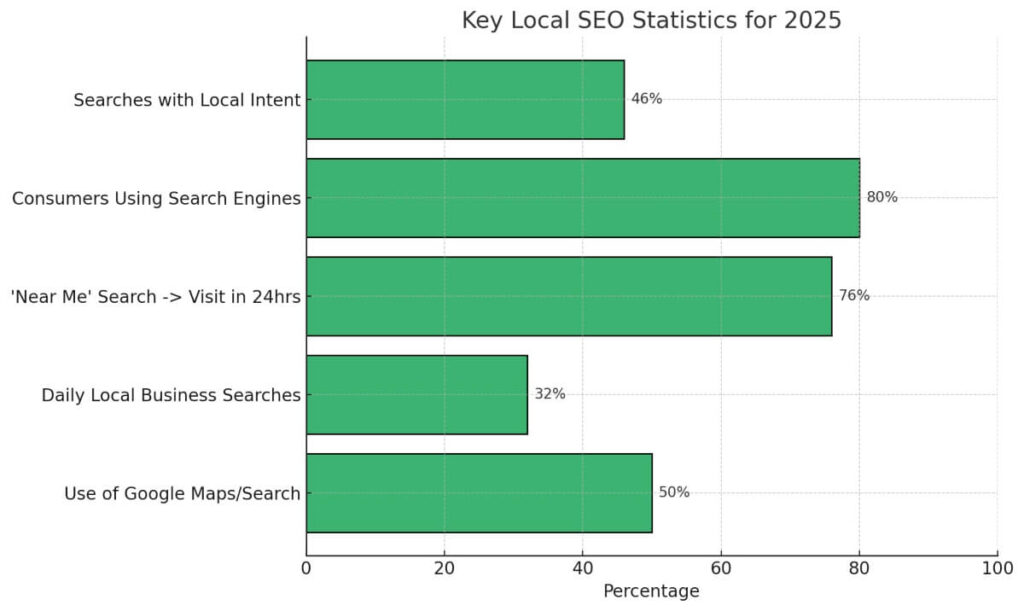
It’s more relevant than ever before. Although more and more people are using AI tools instead of Google, they still trust local results in Google.
Backlinko compiled a list of revealing statistics about local SEO in 2025:
- 46 percent of searches on Google are local intent searches, according to Search Engine Roundtable
- According to Google statistics, 4 out of 5 consumers use search engines to obtain information about local businesses
- Google reports that 76 percent of consumers who include “near me” in their search visit a business within 24 hours
- 32 percent of consumers say they look up local businesses online one or more times each day (SOCi)
- The most commonly used tools for local searches are Google Maps and Google Search; more than half consumers look up local businesses with these tools
You’ve probably seen stories or statistics about people being addicted to their smartphones. Given this situation, local search is incredibly important because when people search on their phones, they’re looking for immediate solutions nearby. If they’re voice searching, they are also more likely to be searching for something that’s location-specific.
How Does Local SEO Work?
Local SEO prioritizes factors like relevance, distance and prominence.
Relevance measures how well your business matches what someone is searching for. That’s why you need to make sure:
- Your Google Business Profile has accurate business categories
- You use location-specific keywords in your content
- You have a relevant business description
- You offer services that match what users are searching for
Distance is about how far your business is from the searcher or the location the searcher included in his or her search. You can’t change your business location, but you can still:
- Optimize your site and Google Business Profile for nearby neighborhoods and landmarks
- Use geographic terms in your content, like your city or neighborhood
- Add local schema markup to your site
- Build accurate citations in local directories
Prominence reflects how well-known and authoritative your business is, both online and offline. Some of the factors that play into prominence include:
- Quality and quantity of reviews on Google and other review platforms
- Links from local websites and directories
- Engagement with your business on social media
- Mentions in traditional media
- Awards and certifications
SEO companies like Stingray SEO Solutions take numerous steps to optimize for relevance, distance and prominence, including:
- Claiming and optimizing your Google Business Profile
- Ensuring your name, address and phone number (NAP) are consistent across directories and other backlinks
- Building local citations in directories that are relevant for your business
- Creating location-specific content on your website, such as blogs targeted to your location
- Earning positive customer reviews and managing your online reputation
- Building relationships with other local businesses and organizations, which can result in mentions in the media, backlinks, reviews and more
Dissecting a Local Search Result
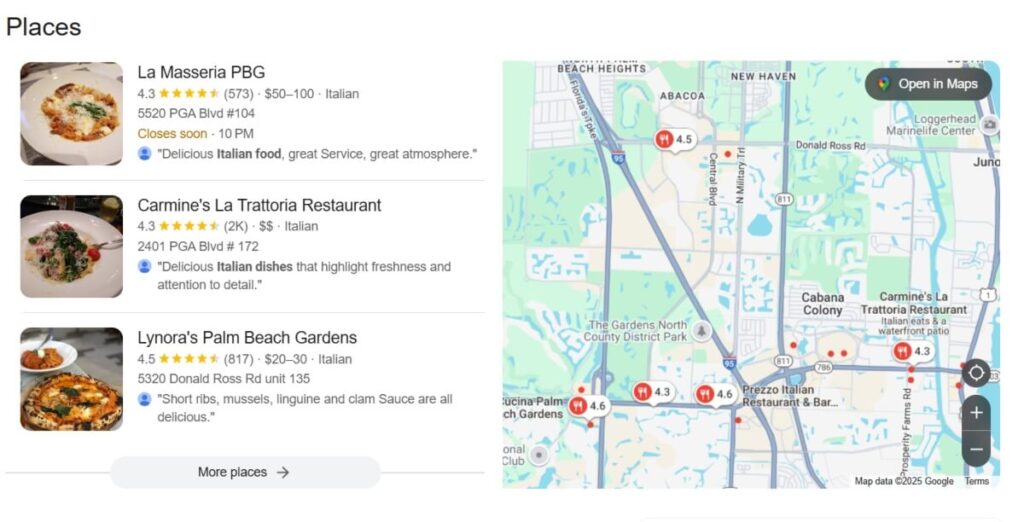
You need to have in-depth knowledge of what shows up in local search results, so you can optimize your site more effectively. A typical local search result includes:
- Local Map Pack: The three businesses that appear in the map section, showing their names, number of reviews and average review rating, addresses, and phone numbers. Some people will scroll down to the organic results, but the majority only click on the three businesses in the Map Pack.
- Organic Local Results: There are traditional organic search results that have been influenced by local rankings. If you have location-specific pages on your website, you can optimize them to show up in these results.
- Google Business Profile Panel: When users click on a business in the map pack, a detailed panel appears with photos, reviews, hours, contact information, and other details about the business.
- Other Local Features: Sometimes Google will display other features, like Popular times graphs, Q&A sections, posts from business owners, booking buttons and more.
There are unique optimization strategies for each of these features. For example, the Local Pack is often about optimizing your Google Business Profile, along with high-quality backlinks and reviews. Organic results prioritize traditional SEO tactics that have a local focus.
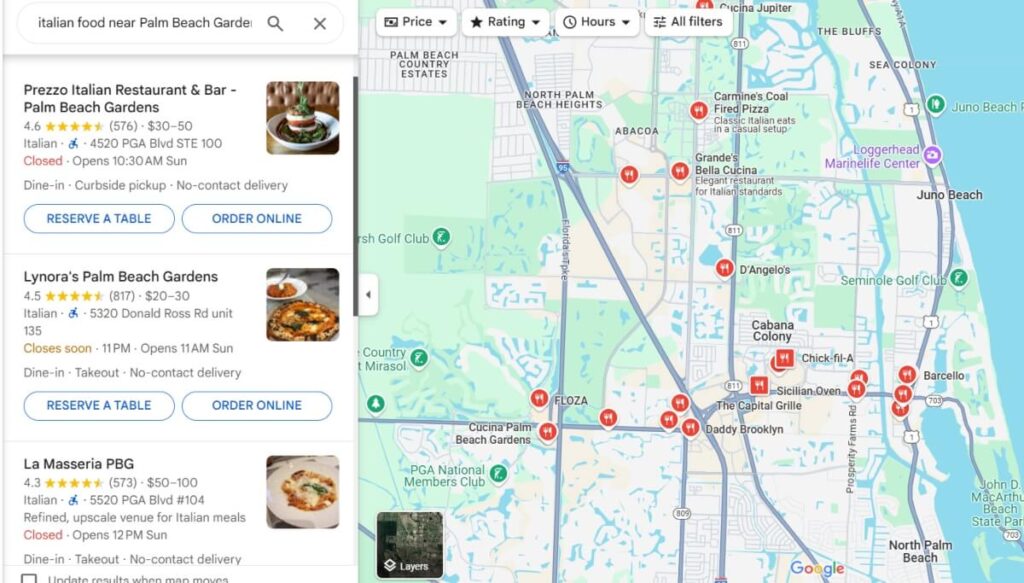
What ‘Local Intent’ Means
Local intent means the search is about finding businesses, services or information in a specific geographic area. For example, a search with explicit local intent would look like this:
- “Pizza delivery in Miami”
- “Auto repair near me”
- “Best restaurants downtown Orlando”
- “Dentist in Palm Beach Gardens”
Implicit local intent means the search has an implied local intent but doesn’t have a city or “near me” in it, such as:
- “Emergency plumber”
- “Wedding venues”
- “Gym membership”
- “Coffee shop”
You’re not going to look for an emergency plumber who serves clients in another state. If you’re looking up a coffee shop, you probably need a cup of coffee, so you want a business that is relatively close by.
You need to understand search intent, because then you know how to create content targeted at that kind of intent.
Stingray SEO Solutions does extensive keyword research to determine search intent and write content targeting that intent.
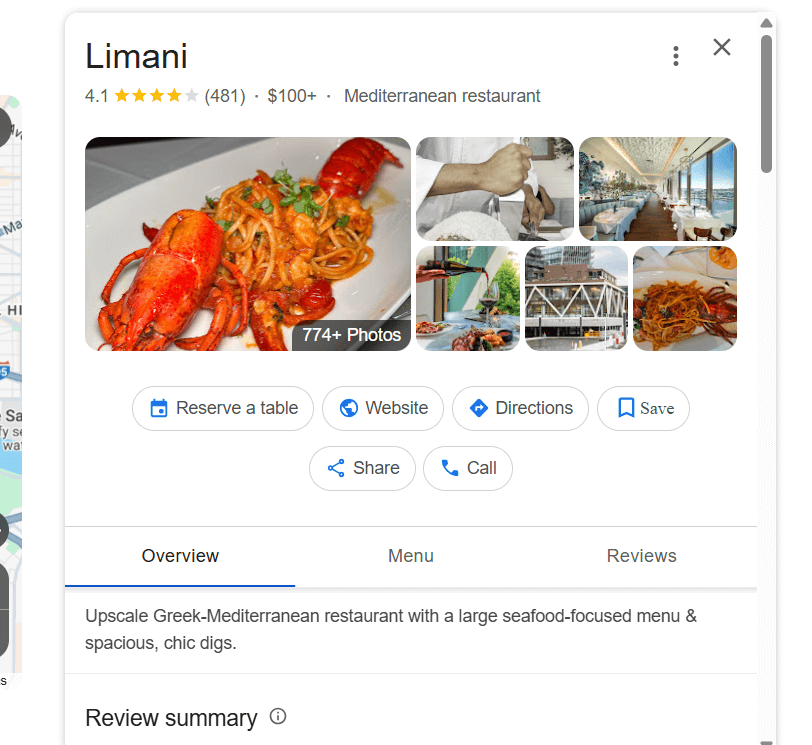
What Are the Best Practices for Local Search?
There are several best practices for getting your business to appear in local search results, whether that means in Maps or organic results. You start off with the fundamentals and determine the unique strategies that work in your market:
NAP Consistency
You need to make absolutely sure your name, address and phone number are consistent on:
- Website pages, including your “Contact Us” page
- Google Business Profile
- Social media profiles
- Listings in local directories
- Review platforms
You need consistency down to the smallest detail. Even small variations like “St.” vs “Street” or different phone number formats can be confusing to search engines.
Complete Business Information
Provide comprehensive details about your business:
- Accurate hours, including holiday hours
- Detailed descriptions of your services
- High-quality photos of your location and your team
- Forms of payment you accept, wheelchair accessibility, etc.
- Service area information if you serve customers where they are located
Actively Acquiring Customer Reviews
Encourage satisfied customers to leave reviews and respond professionally to all feedback:
- Implement a systematic process for acquiring reviews
- Consistently responding to your reviews, both positive and negative reviews
- Address your customers’ concerns quickly and professionally
- Improving your services based on the content of your reviews
Local Content Creation
Develop content that serves your local community:
- Coverage of local events
- Blog posts focused on the local area
- Service pages focused on your locations
- Announcements of community engagement and sponsorships
Setting Up Your Google Business Profile
You can think of your Google Business Profile as the foundation of your local SEO efforts. If you set things up properly and continue to optimize your profile, you can significantly improve your visibility in local search.
Creating Your Profile
Start with complete, accurate information:
- Verify your business address via Google’s verification process
- Select the most accurate primary category for your business
- Add any secondary categories that are relevant – add up to 10
- Create a compelling description for your business using natural language
- Upload high-quality photos of your business and staff
Ongoing Optimizations
There are many ways to regularly update your Google Business profile, such as:
- Posting weekly updates about services, events or offers
- Adding new photos on a regular basis, especially pictures of recent things your business has done or participated in
- Update business hours for holidays and special events
- Communicate with customers through Google Business Profile messaging
- Answer questions submitted by customers in the Q&A section
Eligibility Requirements
Google restricts your ability to create a Google Business Profile.
You can create a profile, if your business:
- Has a physical location or multiple physical locations where customers can visit, such as:
- Single-location service area businesses, like plumbers or electricians
- Single-location businesses like restaurants
- Restaurants that deliver but also have a physical location that serves customers
- Businesses with multiple locations, like a chain of service providers that has multiple locations
- Seasonal businesses, such as those selling produce
- Home-based businesses
- Serves customers at their business location
- Makes face-to-face contact with customers during standard business hours
- Provides services within a defined geographic area
You cannot create a profile if:
- Your business involves rental properties or vacant buildings without staff
- You’re a seasonal business that does not have a permanent location
- You’re an online-only business that does not have physical interaction with customers
- You’re an individual practitioner who is working from home and does not have a separate business entrance
Building Links
Link building for local SEO can be more challenging than link building for traditional SEO. There are fewer options and it can take more time to build connections with other local businesses and organizations.
Finding Local Link Opportunities
Look for geographically relevant websites, such as:
- Local news websites and blogs
- Chamber of Commerce and business association websites
- Community organization websites
- Local event websites and calendars
- Local government and municipal websites
Focus on Quality Over Quantity
It’s better to get a few high-quality local links, as opposed to more low-quality links. Also, a link from a local news website is often more valuable than a link from a national publication, even though that publication may have higher domain authority.
Here are some do’s and don’ts:
- Make sure you’re getting links from sites that are relevant to your industry or location
- Don’t use link farms or link schemes
- Work to earn links through real relationships with other people, businesses and organizations, or by creating content that other sites want to link to
- Sponsor or volunteer at community events, which often include backlinks on event websites
- Consider creating scholarships for those in the community, which can be linked on university and scholarship websites
- Donate to causes in the community, which often comes with backlinks or mentions on local organization websites
Stingray SEO Solutions offers local link building services based on detailed research of your geographic area and competitors to find the links that are going to drive local rankings.
Local SEO Strategies for Your Website
You also need to optimize your website for local search.
Create Location-Specific Pages
Create dedicated pages for each location you serve:
- Individual pages for each physical business location – put the location in the meta title, description, headline and body content for each page; include relevant local links and focus on the local audience when writing the page
- Service area pages for communities you serve
- Neighborhood-specific landing pages with unique, valuable content
- Location-based blog posts and resources
Local Schema Markup
Schema, also called structured data, helps search engines better understand your business:
- Add LocalBusiness schema for your main business information
- Put your address, contact info and business hours in structured data
- Define your service area if you travel to customers
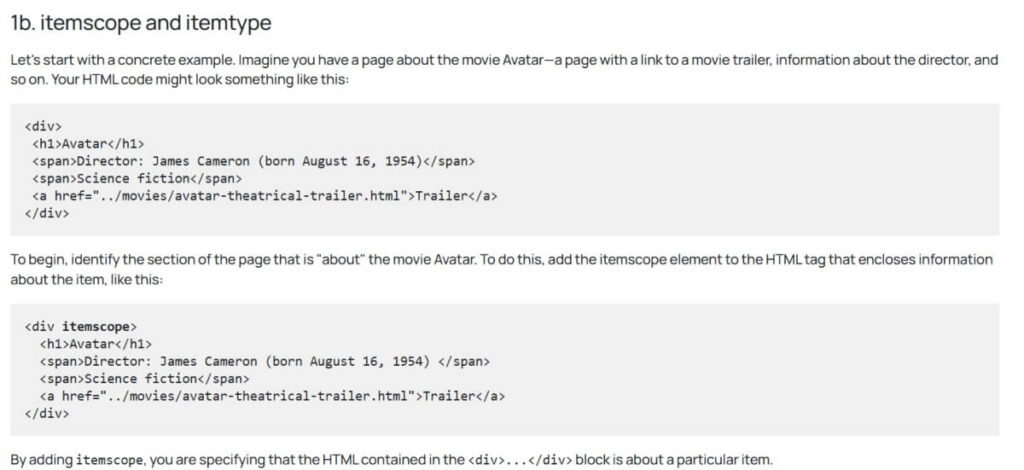
Mobile Optimization
You have to make sure your site performs well on mobile devices, because that’s where most local searches happen.
- Make sure the site loads quickly – less than 3 seconds
- The click-to-call buttons need to be easy to use
- Users should be able to easily navigate the site and see clear calls-to-action
- The basic information about your business is displayed prominently
Creating Optimized Landing Pages
A landing page is the place where someone lands after clicking on your business in local search results. You need to make sure these pages are optimized so they are more likely to rank in local results.
Structuring the Page and Content
- Write clear headlines mentioning your service and location
- Provide detailed descriptions of the services you provide
- Add case studies and testimonials when possible
- Provide contact information and directions so customers can find you
- Embed Google Maps of your location, especially on your homepage and contact pages
- Add videos when possible, especially video case studies or reviews
- Special offers for customers
- Links to your social media profiles
- Bios of your staff members
- Descriptions of amenities at your location, including parking
- Links to podcasts people from your organization appeared on
- Information on career opportunities
- Links or images of licenses, relevant degrees, membership, industry awards and press coverage
Local Keyword Integration
Use location-based keywords naturally throughout your content:
- Include city and neighborhood names in titles and headers
- Reference local landmarks when it makes sense
- Talk about local events when possible
- Use conversational language
Optimize Your Pages to Convert Visitors
Design your pages in a way that motivates visitors to contact you or purchase your products or services:
- Clear, prominent contact information
- Provide multiple ways to get in touch (phone, form, live chat)
- Add reviews and testimonials, showing that others trust you
- Clear calls to action telling users what to do next
What About Duplicate Content on Landing Pages?
It can be difficult to avoid duplicate content on location landing pages. You are inevitably going to have some of the same information on multiple landing pages.
Duplicate content is not good for rankings. Google views duplicate content as a sign of a low-quality website.
You need to take the time to create unique content for each landing page. Find unique ways to present similar information. Often, AI tools can be a muse to give you ideas for how to present similar information in a unique way. You can then generate unique content. Focus on providing information to assist customers.
Can You Publish a ‘Geoblog’?
Geographic or location-based blogs could help boost your local SEO performance. A geoblog is one that provides information specifically for those in the local community, helping establish your business as a local authority.
Content Ideas for Local Blogging
- Write about local events and local businesses
- Provide seasonal tips that are relevant for your area
- Write about customer success stories and case studies
- Provide insights that can be applied locally
SEO Benefits of Geographic Content
- Includes local keywords
- Could attract local backlinks and shares on social media
- Gets the local community spending more time on your website
- Shows your expertise to the local market
- Provides an opportunity for the local media to cover your business
How Often Should I Geoblog?
- Publish every week if possible; if not, publish monthly
- Find topics that are of genuine interest to the local audience
- Add pictures from the local area and text references to the local area
- Share your content on your social media profiles
- Respond to comments on social media
While there are many tactics to improve your performance in local search results, one of the most important things is to provide exceptional service to your clients/customers. If customers have a great experience with your business, they are going to tell others. They may also leave positive reviews. These increase your average review rating, which help boost your ranking in local results.
Customers can also recommend your business on social media and they may talk about it on other platforms, like in blogs or podcasts or even YouTube channels. They may also link back to you.
While you are probably going to need to do outreach on your own to acquire backlinks and reviews, you can also naturally acquire links, social proof and reviews simply by doing a great job with your customers.
Ready to develop a local SEO strategy that drives results? Contact Stingray SEO Solutions for a free consultation: 561-316-8137.
What are the Benefits of Local SEO?
Here are some of the numerous advantages of local SEO for location-based businesses:
- Local searchers are often ready to buy or come to your location
- These searchers often call
- Much higher conversion rates than general organic traffic
- There is much less competition at the local level
- You can outrank larger national brands in local results
- You can dominate the local market
- Costs less than advertising
- You have increased visibility in local directories and publications
- You have a better opportunity to partner with local organizations
- Stronger reputation in the local community
What Are the Cons of Local SEO?
It’s not all wine and roses with local SEO. For example, local SEO can limit your reach in the marketplace. Your growth is limited by the size of your market. If you want to expand further, you need to open a new location.
Other cons of local SEO include:
- Needing to make regular updates to business information across multiple platforms
- Constantly monitoring your reviews and responding to them
- Continually creating more content
- Managing multiple location profiles for multi-location businesses
- Local ranking factors often change, which could dramatically affect your visibility in local search
- Negative reviews can really hurt your rankings
- Fake reviews can hurt your reputation
What Kinds of Businesses Should Use Local SEO?
Local SEO works best for businesses that serve customers in specific geographic areas:
Service-Based Businesses
Companies that provide services to local customers:
- Plumbers, electricians, and contractors
- Attorneys and accountants
- Healthcare providers and dental practices
- Real estate agents and mortgage brokers
- Pet services and veterinarians
Retail Establishments
Businesses with physical locations where customers shop or purchase services:
- Restaurants and cafes
- Retail stores and boutiques
- Automotive services and repairs
- Fitness centers and spas
- Entertainment venues
Professional Services
Local professionals like:
- Consulting firms
- Marketing agencies
- Financial planners
- Wedding planners and event coordinators
- Home improvement companies
Hybrid Businesses
Companies serving both local and broader markets:
- E-commerce businesses with local showrooms
- Online services with local pickup options
- Franchises with local ownership
- Regional businesses expanding their service areas
What is National/Organic SEO?
National or organic SEO is about ranking for keywords that are not geotargeted or are targeted at a much broader audience. These searches are often more informational and have much higher competition than local keyword.
National SEO strategies focus on:
- Building domain authority through high-quality content
- Earning backlinks from authoritative websites across various industries
- Targeting competitive keywords with high search volume
- Creating comprehensive, expert-level content
- Technical optimization for large-scale websites
Key Differences from Local SEO
Traditional SEO has vastly different principles from local SEO:
- Competition level: These keywords have much higher competition because they are much more popular
- Timeline: it can take a longer time to see results
- Content requirements: You need to produce more comprehensive and in-depth content to rank high in search results
- Link building: The focus is on high-authority websites
- User intent: Searchers are not as motivated to buy or visit businesses they find via non-location-based searches. They are higher up in the marketing funnel and are often just looking for information. They are not ready to make a purchase.
Industries That Benefit Most From National SEO
Certain kinds of businesses can see better results from national SEO:
- Software as a Service (SaaS) companies
- E-commerce businesses that ship across the nation
- Online education and training providers
- National brands and franchises
- Publishing and media companies
How Does Organic SEO Work?
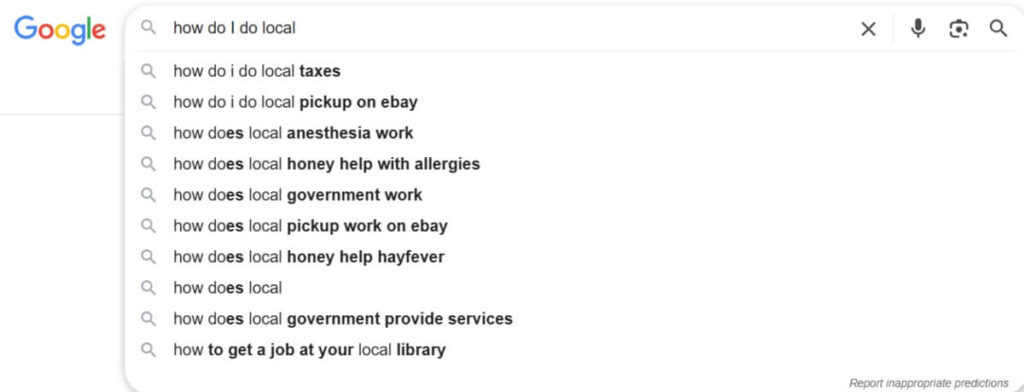
With organic SEO, you need to demonstrate expertise, authority and trustworthiness on a much wider scale than local SEO.
Building Authority With Content
- Create comprehensive content clusters around main topics
- You need pillar pages that exhaustively cover a topic
- Publish high-quality content that addresses users’ questions
- Regularly update the content to keep it fresh
Technical SEO at Scale
National SEO often involves more complex technical considerations:
- Site architecture that supports hundreds or thousands of pages
- Advanced internal linking strategies
- International SEO considerations for global businesses
- Large-scale schema markup
Competitive Analysis
You need to do much deeper analysis to understand the competition:
- Identifying content gaps you have with your competitors
- Carefully reviewing competitor backlink profiles
- Understanding user search behavior in multiple regions
- Monitoring algorithm updates and how they affect rankings
Anatomy of a Traditional Search Result
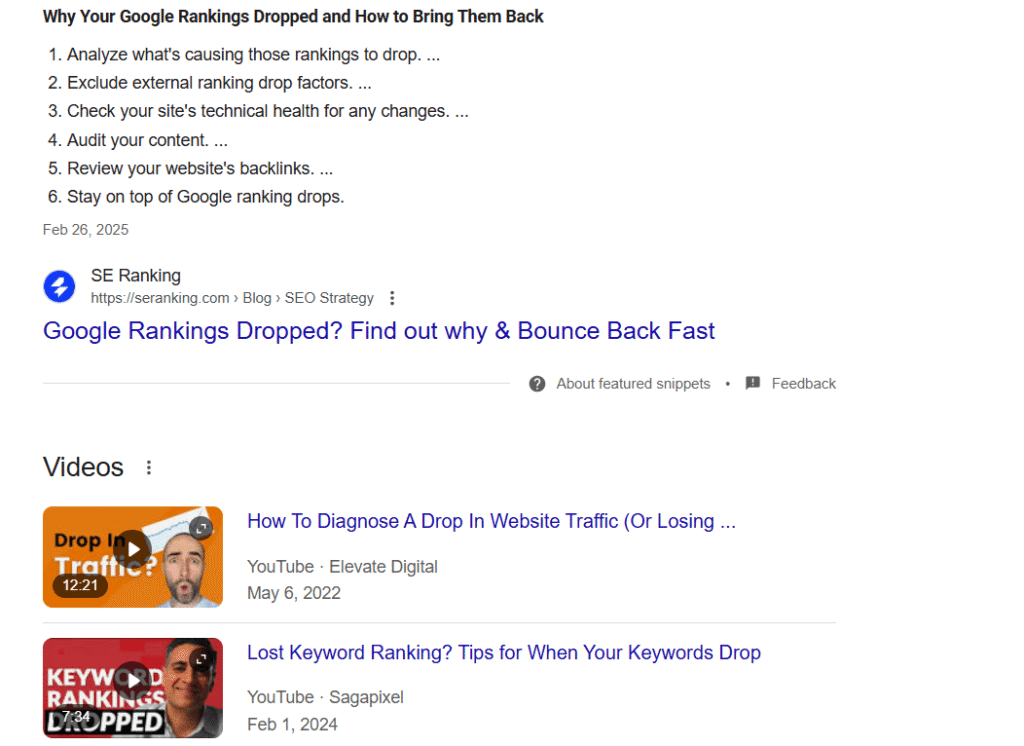
Traditional organic search results are much different than local results, as they often start off with the organic results:
- Blue headline links (title tags)
- Green URL display
- Meta description snippets
- Sitelinks for brand searches
- Featured snippets for informational queries
Some of the SERP features you may see in organic results include:
- Knowledge panels for brands and entities
- Featured snippets answering specific questions
- People Also Ask sections
- Image and video results
- Shopping results for product queries
Ranking Factors for Traditional Organic Search
Some of Google’s priorities for ranking content in organic search include:
- Content quality and comprehensiveness
- Domain authority and backlink profiles
- User experience
- Technical SEO
- Brand recognition and search behavior
Traditional SEO Strategies
These are some of the best practices for traditional SEO that can help businesses achieve ongoing results:
Content That Establishes Thought Leadership in Your Industry
- In-depth guides and tutorials
- Original research and data studies
- Expert interviews and thought leadership pieces
- Comprehensive resource libraries
- Regular blog posts targeting relevant keywords
Link Building at Scale
You are going to need a lot more links than you would to rank locally. You can acquire these links by:
- Creating linkable assets like tools, calculators or unique research
- Guest posting on high-authority industry websites
- Building relationships with journalists and industry influencers
- Earning mentions through PR and thought leadership activities
- Participating in industry events and conferences; you can also sponsor these events to acquire backlinks
Technical Optimization
- Site speed optimization for all pages
- Mobile-first design and development
- Advanced schema markup
- XML sitemap optimized for large sites
How To Optimize Your Website For Organic Searches
These are some of the things you must do to optimize your website for national searches:
Keyword Research and Strategy
- Identify high-volume, competitive primary keywords
- Find long-tail keyword opportunities with lower competition for your blog
- Create keyword clusters to help you rank for many keywords around a topic
- Monitor keyword trends, as important keywords can change, especially search volume and competition
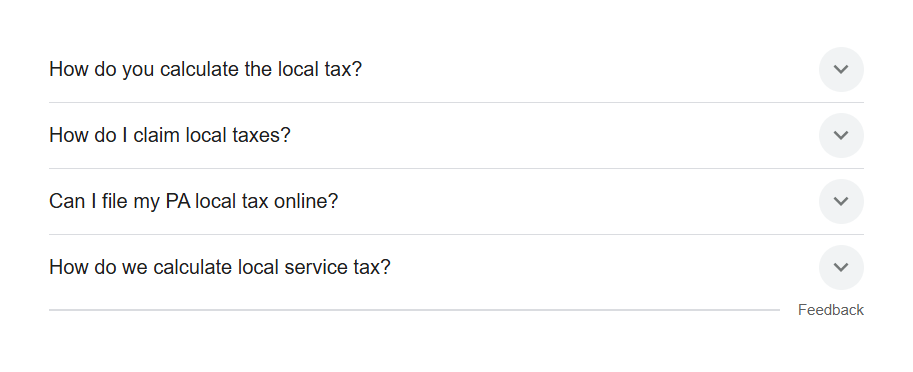
Content Architecture
- Develop topic clusters around the main themes of your business
- Create pillar pages that cover broad topics in a detailed way
- Build supporting content that links back to pillar pages
- Create a logical internal linking structure to make your site user friendly and friendly to search engine crawlers
Optimize for Great User Experience
- Improve page loading speeds across all devices
- Optimize your site to get high scores in Core Web Vitals
- Design intuitive navigation that helps users find information
- Create clear conversion paths for different user intents
- Make your site accessible to user with disabilities
What Are the Benefits of Traditional SEO?
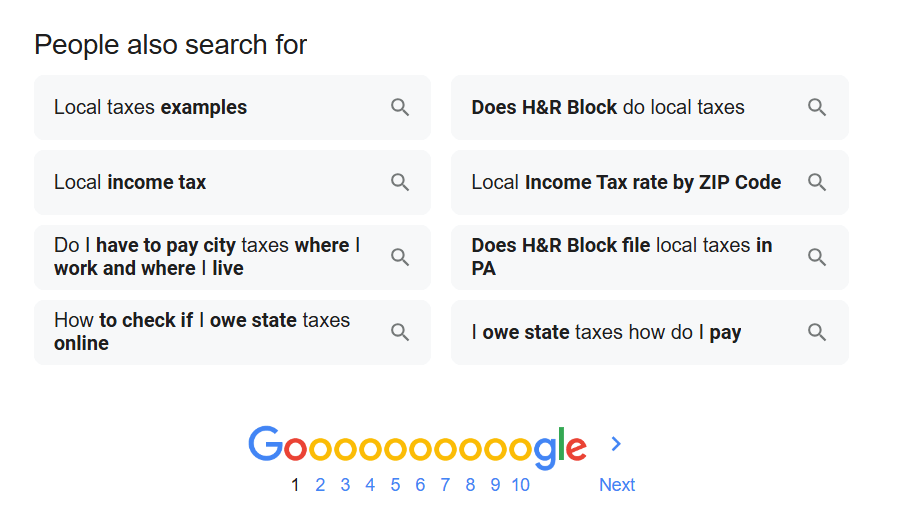
Scalable Traffic Growth
Organic SEO can deliver massive traffic increases:
- Single pages can rank for hundreds of related keywords
- Successful content continues generating traffic for years
Brand Authority Building
High organic rankings show your credibility in your industry:
- Top rankings signal expertise and trustworthiness
- Consistent visibility builds brand recognition
- Thought leadership tells users you are an industry expert
- Higher visibility increases your opportunity to acquire backlinks and media mentions
Competitive Advantage
- It is difficult for competitors to compete with your authority
- As keyword clusters emerge, you can rank higher more quickly because of your existing rankings
- You have the ability to influence industry conversations and trends
- You are more protected from declines in rankings caused by algorithm changes because you have so much content
Cost Efficiency at Scale
Organic SEO becomes more cost-effective as it scales:
- Lower cost per visitor as organic traffic increases
- You become less dependent on paid advertising
- Sustainable growth without ongoing media costs
What are the Biggest Differences Between Local and Organic SEO?
Geographic Scope and Intent
Local SEO focuses on specific geographic areas and users with local intent, while Organic SEO targets broader audiences without geographic limitations.
Competition Levels
Local markets typically have fewer competitors, making it easier to achieve visibility. National organic search often has intense competition from large brands that have deep pockets.
Ranking Factors Priority
Local SEO prioritizes proximity, Google Business Profile optimization, and local citations. Organic SEO emphasizes content quality, domain authority and technical optimization.
Timeline for Results
Local SEO often shows results faster due to lower competition and geographic limitations. It can take longer for organic SEO to lead to high rankings and higher website traffic.
Content Strategy
Local SEO content focuses on community relevance and local keywords. Organic SEO content must show expertise and detail to compete.
Measurement and KPIs
Local SEO success is measured through local search visibility, Google Business Profile metrics, and local conversions. Organic SEO focuses on overall traffic growth, keyword rankings, and visibility on a national scale.
Is Local SEO Easier Than Organic SEO?
Local SEO is generally easier to do, but local and traditional SEO require consistent effort.
Why Local SEO Can Be Easier
- Lower competition in most local markets
- Clearer ranking factors
- You don’t need as much content to establish local authority
- More predictable outcomes in established local markets
Why Organic SEO Is More Challenging
- Intense competition from established national brands
- You need a lot more content to build your authority
- There are much longer timelines to generate results
- More complex technical requirements
If you have numerous locations and you need each one to rank for “[product name] in [city name]”, local SEO can become much more challenging. You will need to do considerable work to achieve high rankings and maintain them.
You also need to realize that local SEO is about local ranking factors and traditional ranking factors. If you’re not trying to rank locally, you may have fewer ranking factors to worry about. However, both types of SEO are challenging. You can’t believe social media ads telling you SEO is easy, or you can just allow AI to do it.
The Reality for Most Businesses
While local SEO may be “easier,” you still need:
- Consistent, strategic effort over time
- Understanding of current best practices
- Regular monitoring and optimization
- High-quality content
- Professional expertise
Do Organic and Local SEO Affect Each Other?
Organic and local SEO strategies can complement and strengthen each other, if you do it right.
For example, strong organic SEO can boost your rankings in local search:
- Domain authority from organic link building helps local rankings
- Content quality can benefit you in local and traditional search
- Technical optimization improves your performance for any type of search
- Brand recognition from organic visibility helps demonstrate your trustworthiness to the local market
Local SEO can also support your efforts in traditional organic search:
- Local links contribute to overall domain authority
- Local content can rank organically for broader terms
- Business citations provide additional brand mentions
- Review signals may influence the overall credibility of your website
How to Coordinate Both Strategies
- Use local keyword research to identify organic content opportunities
- Include location-specific sections in comprehensive guides on your site
- Build local relationships that can provide additional linking opportunities
- Create content that serves both local and national audiences
Need help developing an integrated SEO strategy that maximizes both local and organic opportunities? Contact Stingray SEO Solutions.
Which is Better: Local SEO or National SEO?
Choose Local SEO When:
- Your business serves customers in specific geographic areas
- You have physical locations where customers visit
- You provide services that require a local presence
- You’re competing in less saturated local markets
- You need faster results with smaller investment
- Your target audience is usually doing searches with local intent
Choose National SEO When:
- You serve customers across broad geographic areas
- You sell products or services online across the nation
- You have significant resources to make a long-term investment
- You’re trying to build a national brand
- Your industry is not as dependent on geography
- You’re willing to invest in longer-term results
When Should I Do a Hybrid Approach?
- You serve both local and national markets
- You’re a growing business that is trying to expand nationally
- You have franchises or you are a multi-location business
- You serve local and remote customers
- You have the resources to do both
Can I Rank For National and Local Keywords?
Many businesses can and should pursue both national and local keywords. You can target both types of keywords with different types of content:
- Target local keywords with location-specific pages
- Develop comprehensive guides for national topics
- Use location modifiers naturally in national-focused content
- Build separate content clusters for local and national terms
- Use national pillar pages to cover broad industry topics
- Local service pages target searches specific to your area
- Location-based blog content to engage the local audience
- National resource pages that show your industry experience
Are you looking to rank locally or nationally? Contact Stingray SEO Solutions for a free SEO consultation to discuss effective strategies to get results.
